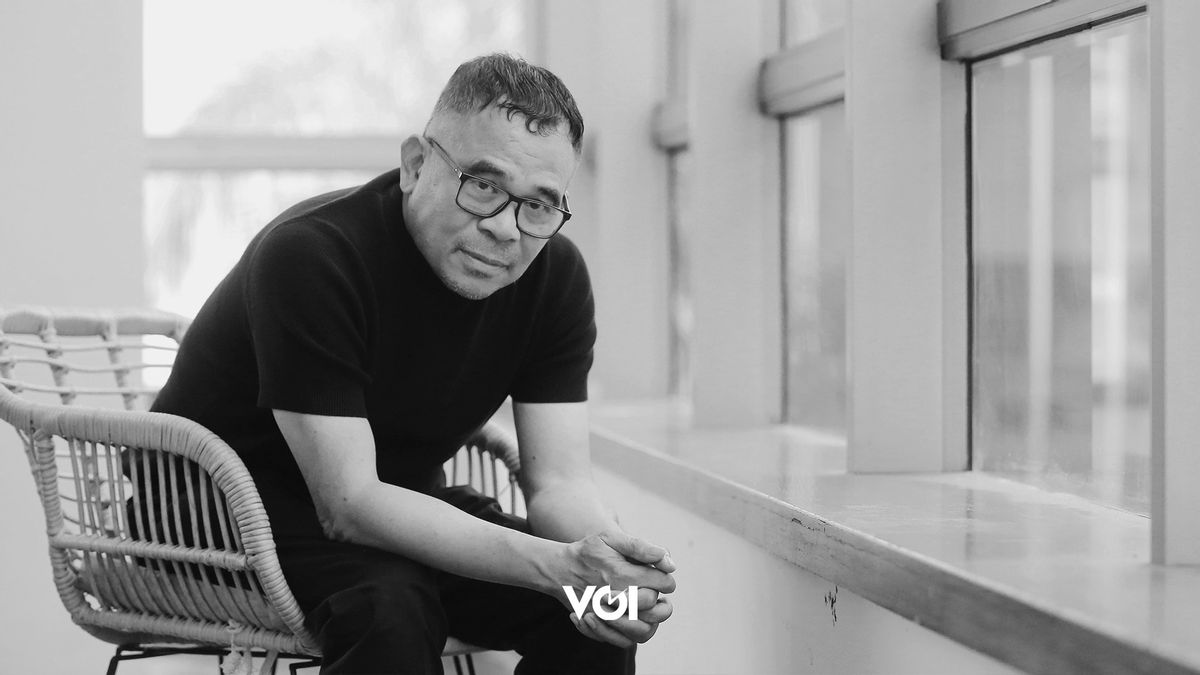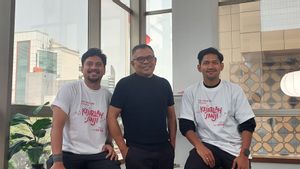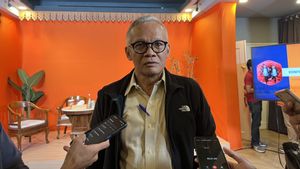JAKARTA - Director Garin Nugroho has released his latest film entitled Kejarlah Janji which invites several talented Indonesian actors such as Cut Mini, Ibnu Jamil, and Shenina Cinnamon. The film, which collaborates directly with the General Election Commission (KPU), was deliberately made to provide knowledge to the public regarding the general election period (Pemilu) which will soon be celebrated by the Indonesian people.
When visiting the VOI office, Garin Nugroho specifically talked about his life journey and his biggest hopes in the world of Indonesian cinema. The owner of the real name Garin Nugroho Riyanto said that he was born into a family that is not far from the world of art.
His father is a writer and his two older siblings studied Fine Arts at the Bandung Institute of Technology (ITB). Even so, Garin's father advised him to still have general knowledge, not just skills.
“Yes, my childhood was in Jogja. My family are writers. My father is a writer, book printer, brother of Fine Arts ITB, two, so, a home for dancing. So, the art space is all there. But in the family home there is always a term for learning general sciences, but learning skills, you only require that. You want to learn general things, but also have skills. "That's basic and forms a lot," said Garin Nugroho in Tanah Abang, Central Jakarta, Thursday, September 14.
His journey in choosing a film as his heart was not an easy path for Garin Nugroho to take. He admitted that when he was little he had tried various kinds of skills that he thought could be his own talents. When he was in junior high school, Garin had the courage to send his writing to a children's magazine, which at that time was certainly difficult for children his age to do.

Not wanting to give up, he finally tried to look for other skills that he might be able to pursue. Garin finally tried to follow in the footsteps of his two older brothers in the world of fine arts, namely drawing. Unfortunately, when he wanted to pursue writing or drawing, Garin always received criticism from both his father and his two older brothers, this is what ultimately made the man who won the Citra Cup for Best Director choose films which at that time were entertainment outside the home for him from childhood to adulthood.
“When you were little you had to be knowledgeable, you had to be skilled. Skills are sought after. My family is good at writing. I'm too lazy to write, when I was little I wrote in children's magazines, that was criticized, even though it was very difficult to get into children's magazines. My drawings are cartoons for magazines. Gosh, that's the number one magazine for young children. Middle school, that was an achievement, I was still criticized because my older brothers were in fine arts, then I looked for a way to find a medium of expression that the family didn't have, then the film was born, what's good is if my child even better than me, Kamila, and so on so, so my family have diverse arts and knowledge," he continued.
“Because every time I choose another discipline, my brothers criticize me. Criticizing paintings, criticizing writing for a long time, finally choosing something else. At that time, films were popular, yes, in my childhood films were the only entertainment outside the home, outside TVRI, so films were the golden child when I was growing up as a teenager and adult. Even from elementary school," he said.
Not only did he fall in love at first sight with the world of film, Garin finally decided to deepen his knowledge regarding film to education, where he studied film at the Jakarta Arts Institute (IKJ). In 1981 he made a short film and continued to make longer films after graduating from college.

"Then I went to school at Loyola Semarang, I did a lot of theater, then I went to Gadjah Mada or IKJ, and finally I chose IKJ. And then, film school, then starting in 81 making short films like that and then making long stories after graduating, in 90, 91, when Indonesian films were all in crisis, there were almost no films, I made Love a Piece of Bread to Leaves Above First chance pillow, and so on. "Broadly speaking, it's like that," he continued.
"The first film that was lost was called Cintaku Lewat Didepan Rumah, because I fell in love with my neighbor, it just tells the story of the neighbor passing by, and then the one that was made wasn't until 85. In fact, it was made into the film 'Gerbong 1, 2, 3'. There's still a film, it's like essay, about a boy and girl meeting at a train station. "Then I tried making educational films, then documentaries, then films from all over the audiovisual industry," he added
"In 95, I made documentaries of children from all over the island on TV, made advertisements like Gudang Garam, then made music studios like Negeri di Awan Katon, Chrisye, then made whole maps in the peak period, like in 95 I tried, then in This year is also the peak of new media, that's why I'm trying to make a cycle that uses a cellphone camera, vertical cinema, then supervision for YouTube like Payung Fantasi to make works for Netflix, Perfect F for director Hadra. "Then I made a stage, so I tried all the maps from that period," he said.
Having worked since the 1980s until now, this father of four children has experienced various periods of technological growth in the world of film. Even so, Garin said that changes, especially in the world of film technology, were bound to happen, whether we wanted to or not.
SEE ALSO:
The most important thing for Garin as a director is to remain focused on the use and human content that is told in each of his films.
“Technology will definitely change, there's no need to be too arrogant. For example, if I'm from the TV generation, I keep saying 'If you don't appear on TV, you can't live' then in the new media generation, no, that's just normal. The discovery of technology to serve humans is nothing extraordinary, what is extraordinary is how it is used for humans, creativity. But yes, I have experienced changes, from big radios to small ones, from transistors to TVs, analog TVs to digital TVs. Cameras from 8 millimeters to 35 millimeters, you know, then is there anything more important? Yes, there aren't any," he explained.
"Every technological discovery brings change and how we provide humanitarian content, there is no other way but it is impossible. I'm bored, when it's camera time, videos, 'Without videos you can't live, this generation', then when it comes to new media, 'Now this generation doesn't understand this', I just go 'Hmmm'. That is, if you come to understand life, change is normal. What is extraordinary is its use for humanity. "For creativity, for productivity, for critical nature, that's all," he explained.
Keep Adapting

This 62 year old man admits that he has difficulty adapting to every technological change in the world of film. But for him, this is an advantage because even though he has to continue to adapt, he also learns new things as happens in every human's life. Therefore, Garin said that every filmmaker must always be able to return to point zero at every period of technological change in the film industry.
"Yes, for sure. So it's like people call me a shifting farmer, just like planting crops, in every place the soil is different, the ecosystem is different, so you have to learn. Like you now, I never use my cellphone to buy something because I haven't decided what I want, because then I will be tempted to buy all kinds of things, so I'm right if I have to use my smartphone to buy something, I know, I'm the person who doesn't eat at night. You can sleep and then buy all kinds of things, just see the use, if not that's fine, but I mean there will definitely be adjustments.
Everyone is trained to adapt, like the journey of human life, from small paths, falls, rises, falls. "Later this year, adapt again, oh you can jump, you have to be able to read, you have to be able to do this, adapt again to adapt to this new technology and ecosystem," he said.
"So, for example, I produce, 'Oh, if you join Netflix or a big OTT, the industrial system is like this, the data storage system is like this' 'Oh, if it's vertical cinema' if you make that cycle, with Agni, 'Oh, vertical cinema means what makes the frame and The aesthetic of the composition is no longer left and right but up and down, but editing takes a leap in vertical form, so a filmmaker has to go back to each period from zero. And it has to be a natural beauty, there is nothing that has to be better, nothing. "Each generation builds itself and also stutters itself," he said.

This is also what ultimately makes the director of the film Kucumbu Tubuh Indahku never get bored of making works in the world of film. He explained that he was more annoyed with the changes that had occurred. For this reason, Garin always tries to keep looking for interesting ideas that he will put into audio-visual form so that his work is not always on the same issues or genres even though he has to go through a path that is not always smooth.
"Yes, that's why, if you're bored, it's more about the aspect of seeing lots of tools. Many people are sometimes bored, annoyed, not proud. I'm proud of the 206 crew, or 205 if I'm, 'Oh my God', pissed off. Not to mention that hunting in large productions is just 25 people hunting, they are already annoyed, they are bored. "But that's why we don't want to make a production that repeats itself, because repeating it will cause boredom," he explained.
“There's always a new theme, a new way, something new that makes me think, because if it's new, we're going on a journey, right? If we go up a mountain from the same place, go up, make sure it's faster, see the same view. I don't really like that, I prefer 'Oh from the mountain, from the other side, see a new view, it's bound to fall, it's okay to slip, it's okay', we then think new, even though I'm being lured,' Oh, that's a good commercial film, Mas Garin, do you want to do it again?' I don't want to, why do you repeat the same thing? That's it, right? It's better if our adrenaline builds up for things like, 'How many sides does that mountain have? Why do you have to be fast?' 'Mr Garin has to be fast', 'I'm not chasing fast, I'm chasing new journeys and new views', like that," he explained.
"Even though it's a bit difficult to find sponsors, looking for this, for example making something called horror, if the horror is made traditionally it will definitely sell. We all know this, but if horror is a beautiful horror player, suspend it, if you like poetry, like metal music, and if the structure is different from the others, it will definitely not sell well. "It's a horror period, poetry, metal, but yes, I like it, it gives me a new adrenaline rush, if you repeat the same thing, what's the point of living if you repeat the same thing, which everyone has consumed, it's boring for me," he said.

In the end, this anxiety became Garin Nugroho's biggest hope in the world of Indonesian cinema. The man who is nicknamed the 'traveling teacher' wants three important things to happen in the film industry, namely diversity, novelty and building a market which of course is accompanied by growth too. For him, this will be something interesting for film lovers in the future.
"Yes, actually what I hope for is diversity, newness and building a market that is also very diverse so there is a kind of diversity, newness and growth, those 3 are all. "So if there is market diversity, there is diversity of ideas, there are ways of speaking, then there is diversity of audiences, and there is diversity of novelty," he said.
"So, for example, the horror genre is good horror if you follow your tastes, but creating a certain type of horror, right? KPop is a novelty, creating something new, so I hope that life will become interesting with the diversity and novelty in various things in films, accompanied by growth. That's how it is," explained Garin Nugroho, closing the conversation with VOI.
The English, Chinese, Japanese, Arabic, and French versions are automatically generated by the AI. So there may still be inaccuracies in translating, please always see Indonesian as our main language. (system supported by DigitalSiber.id)

















